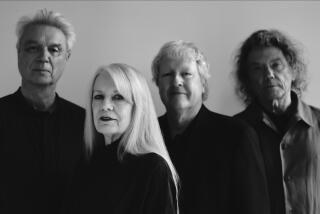A Most Revealing David Byrne
SAN JUAN CAPISTRANO — What happens when rock’s sartorial Renaissance man gets buck naked?
At first, there’s a tremendous feeling of newfound freedom, as David Byrne demonstrated Tuesday at the Coach House. Long rock’s disinterested observer in the button-down collar, Byrne achieved that feeling several times in his new guise as an artist working in the emotionally exposed first person.
But then there also were a number of times when he came across like nothing so much as a man in search of a bathrobe.
Ultimately, the freed-up man won out in Byrne’s nearly two-hour set, part of a Southland swing that was scheduled to play the Wilshire Ebell Theatre on Wednesday and that brings him back to the Coach House for a sold-out show on Friday.
Having jettisoned the Latin big bands that laid the foundation for his previous two solo albums, Byrne fronted a quartet that was as forceful as you’d expect a rock foursome to be. Yet the band--drummer Todd Turkisher, bassist Paul Socolow and Mauro Refosco on mallet instruments and percussion--was every bit as versatile as you’d expect of one backing the former Talking Heads front man, whose career has wended its way from nerdy new wave to muscular funk to Afro-pop to salsa.
He played all but two of the dozen songs off his new “David Byrne” album, songs in which he strives to achieve closer contact with the listener through lyrics largely stripped of the wry detachment that define his earlier work. (One he skipped, ironically, was the album-closing “Buck Naked.”) But simply being closer isn’t always better.
Naked can mean exposed, and in many instances Byrne reveals himself with almost painful honesty, as he did when he sang: “I need someone to cover me with kisses when I’m alone and scared” in “Lilies of the Valley.”
Naked can also mean just plain bare, and that’s how some of the album’s truisms sound, like this one from “Back in the Box”: “The sun shines on the evil / The sun shines on the good / It doesn’t favor righteousness / Although you wish it would.”
The lyrical straight line may be the shortest distance between two points, but it’s not always the most interesting route. It’s the difference between Randy Newman saying straight out: “Wasn’t slavery a horrible injustice?” versus capturing a slave trader’s mind-set in “Sail Away” when he wrote “Climb aboard, little wog / Sail away with me.”
As Byrne quite honestly fessed up in “Angels”--played in the logical spot, right after its rhythmic and structural twin, “Once in a Lifetime”--”I can barely touch my own self / How could I touch someone else?” At least he realizes he’s still a considerable distance from the kind of total soul-baring of John Lennon’s first two post-Beatles albums, Neil Young’s “Tonight’s the Night” or Lou Reed’s “Magic + Loss.”
*
What helped Byrne most in concert were the moments when he expanded upon the album’s arrangements and transcended the carefully thought-out quality that still pervades his music.
For “Crash,” he engaged in some Young-like blasts from his electric guitar that gave wordless voice to the feelings of pain and powerlessness in the face of death referred to in the lyrics.
That seemed to carry over when he dipped into the Talking Heads songbook; it was with renewed vigor that he tackled such cornerstone numbers as “Psycho Killer,” “Once in a Lifetime,” “Don’t Worry About the Government” and an especially cathartic show-closing rendition of “Life During Wartime.”
The latter built to a staggering climax, striking a chord of musical, physical and spiritual abandon that once would have seemed light years beyond Byrne’s artfully self-conscious grasp.
Juxtaposed with Byrne’s new in-the-altogether approach, the Heads material proved that even a nouveau nudist can enjoy throwing on a favorite old suit once in a while.
* David Byrne plays Friday at 8 p.m. at the Coach House, 33157 Camino Capistrano, San Juan Capistrano. Sold out. (714) 496-8930.
More to Read
The biggest entertainment stories
Get our big stories about Hollywood, film, television, music, arts, culture and more right in your inbox as soon as they publish.
You may occasionally receive promotional content from the Los Angeles Times.










